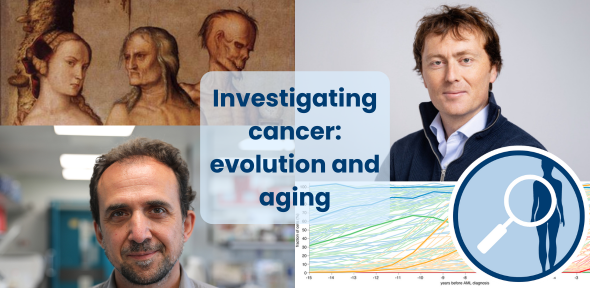
6:00pm-8:00pm on Tuesday 25 March
St John's College Old Divinity School, Main lecture theatre, All Saints Passage, CB2 1TP
The Early Cancer Institute at the University of Cambridge is the only scientific institute in the UK solely dedicated to early cancer research – how and why cancers develop, who may be most at risk of developing them and how we can catch them early, before they have had chance to grow and spread.
These back-to-back talks, presented by two of the research group leaders in the Institute, will outline their research into how cancers originate and how cancer is often associated with aging. Expect lots of interaction between the two researchers as they explain their work in lay terms and discuss how their research translates to real life by contributing to the development of new technologies, treatments and practices.
There will be plenty of opportunities for audience members to ask questions.
THE TALKS:
Professor Jamie Blundell
Predicting and preventing a future cancer: how evolution, genomics, and maths can tell us about early warning signs of cancers decades before they are diagnosed.
Earlier detection of cancers is a major goal for the NHS and CRUK to improve clinical outcomes. This talk will address the following questions: what is the earliest point you could detect cancers? Can you intervene to stop cancer before it develops?
Cancer is a process of Darwinian evolution playing out in the cells that make up our tissues. This talk will show how concepts from Darwinian evolution (e.g. survival of the fittest) can be applied to understand the how cancers develop, spot the earliest signs of a future cancer, and, point us towards strategies to stop it developing in the first place. You will learn about the new world of early cancer detection and prevention, about state-of-the-art genetic technologies and about the mathematics of evolution.
Dr Daniel Muñoz Espín
Ageing and Interventions for Rejuvenation
Human beings have known for thousands of years that ageing anticipates our death. That's why many different cultures throughout history have searched the eternal youth by the Elixir of Life (also known as Elixir of Immortality), the Holy Grail, or the Fountain of Youth. Ageing is featured by a progressive and generalised decline of the structure and function of our tissues and organs, and this results in a growing risk of multiple age-related diseases that, ultimately, will compromise our wellbeing and cause our death. But, what are the triggers of ageing? Are there lifestyle habits and therapeutic interventions to prevent ageing?

